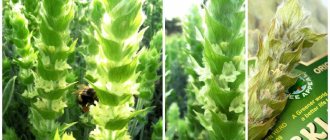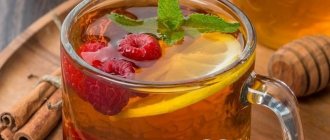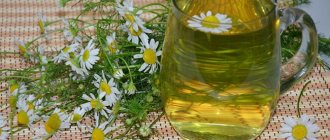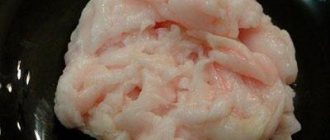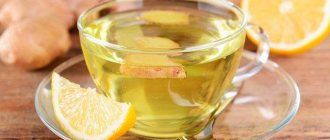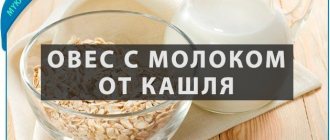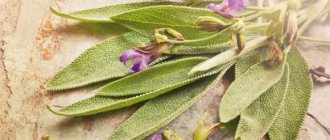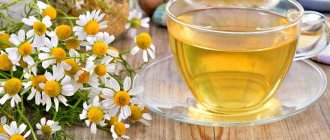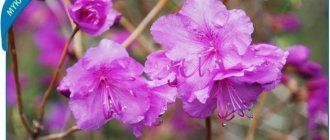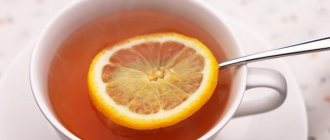Bronchitis is a disease of the respiratory system in which a large amount of sputum accumulates in the bronchi. Herbs for bronchitis are used simultaneously with medications.
When used correctly, they have virtually no side effects.
This combination allows you not only to cope with the disease in a short time, but also to provide the body with useful substances.
The effectiveness of treating bronchitis with herbs
When treating pathologies of the respiratory system, doctors often prescribe not only medications, but also folk remedies.
To obtain a positive effect, it is important to choose the right herbs for bronchitis and direct the therapeutic effect in the right direction.
The main goal of the treatment is to eliminate the symptoms of the disease and the factors that provoked its development. In addition, restoring normal functioning of the respiratory system is of great importance.
Treatment of bronchitis with herbs should be carried out in compliance with the following rules:
- Maintaining a healthy lifestyle. It is possible to speed up recovery by quitting smoking and alcohol. The fact is that tobacco smoke is considered one of the causes of bronchitis, and alcohol has a negative effect on the tissues of the respiratory tract.
- Maintaining cleanliness in the apartment. Dust and dirt are considered provoking factors for the development of bronchitis.
- Taking medications. One of the main conditions on the path to recovery is taking medications for diseases of the respiratory system. Herbs are recommended to be used as a supplement to bronchodilators and expectorants, mucolytics. Depending on the type of cough for bronchitis, medications with a specific effect are selected, and the use of antibiotics is only indicated when identifying pathogenic microflora of the bacterial type.
Many herbs have a whole range of beneficial properties, which is especially important in the treatment of bronchitis.
The disease is accompanied by the appearance of symptoms such as chest pain and cramps, and with the help of medicinal plants it is possible to cope with these manifestations.
Herbal medicines contain a large amount of valuable substances, which is necessary to achieve an immunostimulating effect.
Many patients tolerate natural drugs against bronchitis much better than pharmaceutical products that contain synthesized compounds.
As a result of herbal treatment, the risk of side effects is minimal, and they can be used even when fighting the disease in infants.
You can use herbs in the treatment of bronchitis for a longer period of time than pharmaceutical drugs. In the bronchi, the inflammatory process can occur in different ways, and therapy often takes more than 3 weeks.
Medicines are usually prescribed for 7-10 days, after which a replacement has to be found.
How can you recognize chronic bronchitis?
Inflammation and spread of pathological microorganisms occurs primarily in the bronchial tree. For this reason, the very first and most pronounced symptoms will be signs of inflammation of the bronchial mucosa.
- Nasal congestion. Infection begins with the concentration of pathogenic microorganisms in the nasal mucosa.
- Pain in the throat when swallowing. The infection spreads down to the ENT organs.
- Pain in the chest, feeling of congestion. If the development of the infection is not stopped in time, pathogenic microorganisms will move down to the respiratory organs.
- Cough. At first it is an exhausting cough that does not allow a person to rest, especially at night. It is dry and unproductive. After 3-5 days it becomes productive and sputum begins to be released.
Then symptoms of exhaustion of the body appear as a result of the influence of pathology on all organs and systems.
- Hyperthermia. The patient's body temperature rises to 38 degrees or more; the nature of the manifestation of this symptom resembles acute bronchitis.
- Fever.
- Profuse sweating. When a person begins to sweat excessively, they need to watch for other symptoms, as this may be a sign of pneumonia.
- Chills. This is normal during hyperthermia.
- Headache. This symptom is the result of general intoxication of the body.
- Fatigue, decreased functionality of basic cognitive processes - memory, attention.
- Nausea.
- Reluctance to eat. The patient has no appetite.
- Weakness and apathy. Feeling tired from everything, even from your own body, and lacking the strength to do your usual work.
Chronic form of inflammation of the bronchial mucosa
Infection does not always lead to chronic bronchitis. There is a factor of exposure to harmful substances during bronchitis in adults; bronchitis in adults in this case is not immediately diagnosed. The bronchial mucosa is affected by dust, smoke from smoking, various chemicals, and various infections that often affect the human body.
Over time, with chronic bronchitis, the bronchial tree changes morphologically. The airways become narrow and gradually deform.
This form is characterized by the presence of cough for 3 months or more. Such phenomena are recorded for 2 years in order to make an appropriate diagnosis. However, cases of hyperthermia rarely occur. When chronic bronchitis is diagnosed based on symptoms, help and treatment in adults with folk remedies and medications do not have an immediate effect.
Types of herbs for bronchitis
Before you begin treating bronchitis with medicinal herbs, it is necessary to study their effect on the body.
Diaphoretic herbs
It is best to check with your doctor about what herbs you can drink for bronchitis. Plants with diaphoretic effects are recommended for use in acute forms of the disease and intoxication.
With their help, sweating increases, and harmful substances are removed from the body faster, which speeds up the healing process.
The following plants with diaphoretic effects are considered the most useful:
- Raspberries. This plant has both diaphoretic and antipyretic effects on the body. Collection from branches, fruits and leaves helps speed up the removal of accumulated mucus from the bronchi. Raspberries contain vitamin C, which is a natural antioxidant and immunostimulant.
- Linden blossom has a diaphoretic, antipyretic and bactericidal effect, and also helps to cope with the inflammatory process in the bronchi and fever. Linden blossom is a strong immunostimulant and has sedative and analgesic properties.
Willow bark is also considered useful in the treatment of bronchitis.
Expectorant herbs
The main goal of treatment is to cleanse the bronchi of accumulated mucus and the microbes living in it. Expectorant herbs for acute bronchitis help speed up the removal of mucus and relieve inflammation.
For dry cough, he recommends treating the disease with the following herbs:
- oregano;
- thermopsis;
- coltsfoot.
For a wet cough due to bronchitis, you can prepare remedies based on expectorant herbs such as sage, calendula, licorice, elderberry and marshmallow.
Herbal bronchodilators
To relax the muscles of the respiratory system, the use of plants that have the corresponding effect is required.
When treating bronchitis in adults, it is recommended to use herbs that help expand the bronchi and normalize the functions of the respiratory tract. The following plants with a bronchodilator effect are considered the most valuable:
- St. John's wort;
- series;
- hawthorn;
- mint;
- oregano
In case of acute bronchitis and poor sputum secretion, it is necessary to take decoctions that help thin the mucus.
For this purpose, remedies from raspberries, birch buds, motherwort, yarrow, hawthorn and horsetail can be prescribed.
Herbal remedies for bronchitis
With bronchitis, a dry cough gradually turns into a wet one, which may be accompanied by gagging with the release of a large amount of sputum. For a dry cough, you can mix marshmallow root, birch buds, oregano and elecampane root.
Approximately 30-35 grams of the plant mixture should be brewed with a glass of boiling water and simmered in water for at least half an hour.
The product must be cooled, strained through cheesecloth and added water to the original volume. It is recommended to drink a decoction of herbal tea for bronchitis several times during the day, 30-35 ml.
For a wet cough, it is possible to speed up the removal of phlegm with the help of mint, lungwort, caraway seeds, dill seeds and elderberry. To make a decoction, several herbs are mixed at once.
To prepare a product with an antiseptic effect, you need to mix licorice root, plantain leaves, sage, pine buds and black elderberry flowers in equal proportions.
30-35 grams of this herbal mixture must be brewed with a glass of boiling water and simmered for less than 1 hour. It is recommended to take the prepared product 8-10 times a day, 30-40 ml.
Herbs for obstructive bronchitis
Recipes that will help with this disease:
- Horsetail infusion. Pour 5 g of dried raw material into 0.5 liters of boiling water and leave for 3 hours. Drink 1 tbsp. l. every 3 hours.
- Collection for removing sputum. Mix 1 part dill and calendula, 2 parts licorice in one container. 1-2 tsp. pour a glass of boiling water over the mixture and let stand for 10 minutes. Strain, drink 0.5 tbsp. 3 times a day.
- Decoction with aloe. Place the aloe leaves in the freezer for a week and a half. During this time they will acquire useful properties. Grind 4-5 leaves, add to them 1 kg of honey, 50 g of linden flowers, 125 g of birch buds, 250 ml of olive oil. Cook the mixture for about half an hour. Eat 2 tsp. decoction three times a day.
- The collection is anti-inflammatory. Mix coltsfoot, elecampane, and primrose root in equal parts. Brew 1-2 tsp. collection, insist and drink 0.5 tbsp. 2-3 times a day.
Recommendations for the use of herbs for bronchitis
Herbs are natural raw materials, but this does not mean that they are completely harmless to the body. Treating bronchitis with herbs is allowed only if you strictly follow the doctor’s instructions.
Herbal teas are a medicine, so they should not be confused with regular tea and consumed uncontrollably throughout the day. It is important to monitor the patient’s condition and, if adverse reactions occur, consult a doctor.
It is necessary to stop using the products if problems occur in the kidneys, allergic rashes on the body, headaches, insomnia or increased drowsiness.
When treating chronic bronchitis, herbal remedies must be taken for at least two months. It is important to remember that each plant has both indications for use and contraindications.
Rules for using herbs
Just because herbs are a natural ingredient does not mean they are harmless.
When preparing herbal teas, strictly follow the instructions.
Do not confuse herbal tea with regular store-bought tea. Follow the dosage.
Monitor how you feel. If, while taking the medicinal mixture, you feel signs of discomfort from the nervous system (insomnia, drowsiness, fatigue, headaches), from other organs (kidneys, liver, stomach aching), or signs of allergies appear, stop taking the herb and consult a doctor.
Medicinal herbs that help against chronic bronchitis are used for at least two months.
Remember that each medicinal herb created by nature has its own indications and contraindications.
Author of the article
Therapist, Pulmonologist.
He treats patients with a therapeutic profile, including respiratory diseases such as chronic bronchitis, chronic obstructive pulmonary disease, bronchial asthma, pneumonia, and interstitial lung diseases.
11 years of experience.
Source
Herbal treatment has firmly entered our lives and occupies a fairly strong position in it, since many people prefer naturalness. This is especially true for the treatment of respiratory diseases. In the article we will talk about how tea is useful for bronchitis and what herbs can be used for brewing.
Rules for preparing infusions and decoctions
To treat bronchitis, medicinal herbs can be used either individually or as a collection. Various decoctions and tinctures are made from plants for oral administration or inhalation.
It is necessary to prepare herbal tea for bronchitis in glass or enamel containers.
Infusion
In order to prepare an infusion, you can use the stems of the plant, its leaves and flowers. The product can be taken internally or applied externally.
It is necessary to pour the required amount of plant material into a bowl, pour boiling water over it and leave on low heat for 15 minutes. After this, the container with the broth should be poured into a thermos or wrapped in a blanket and allowed to brew a little.
When preparing a product from leaves and flowers, it is necessary to infuse it for at least half an hour. If the decoction is prepared from coarse rosehip stems or berries, it must be kept for at least 12 hours.
The prepared infusion should be taken several times a day, 100 ml. With a disease such as bronchitis, medicinal herbs help cope with the characteristic symptoms and speed up the patient’s recovery.
Decoction
To prepare decoctions of medicinal herbs, parts of the plant such as bark, roots or hard stems are used.
Unlike infusions, they are absorbed more slowly, but at the same time they act on the body for a longer time. It is necessary to pour the plant material into boiling water and close the container well with a lid.
The product should be kept in a water bath for about 45 minutes, then left for 15 minutes. It is recommended to take the prepared decoction several times a day, 1/3 cup.
The product can be used within two days, but it is best to prepare a new portion every day.
Recipes
When preparing herbal remedies, it is important to follow the recommended proportions of the ingredients used in order to achieve maximum severity of therapeutic effects. The products themselves can most often be bought at a green pharmacy.
Aloe infusion
Aloe has an anti-inflammatory and bactericidal effect, stimulates the immune system . The plant should not be used in case of exacerbation of diseases of the digestive tract, hypertension, intestinal, uterine bleeding, or heart failure.
To obtain an infusion with the plant, you need to mix a glass of aloe juice with the same amount of honey, add 100 ml of water, vodka or alcohol. The product is infused for 5 days in a dark place. It is taken three times a day, a teaspoon before meals.
Aloe juice stimulates the immune system
Chamomile tea for cough suppression
The plant has anti-inflammatory, antiseptic, antibacterial and immunostimulating properties , promotes the discharge of sputum.
Important! The only contraindication for the use of chamomile is individual hypersensitivity to the plant.
To prepare tea, pour 1 tablespoon of plant flowers with hot water and leave for 7–10 minutes. Drink the drink 20 minutes before meals, one cup 3 times a day.
Gargling with chamomile infusion reduces the feeling of sore throat and the frequency of coughing. A full tablespoon of inflorescences is poured with half a glass of hot water and heated in a water bath for a third of an hour. After cooling to room temperature and straining, the product is ready for use. It is recommended to gargle with it 3–7 times a day.
To obtain a decoction for inhalation, add 2 tablespoons of dried flowers to 1 liter of water and boil the composition for 10 minutes. You can also add a teaspoon of soda to the water. When the broth has cooled down a little, breathe in its vapor for a quarter of an hour.
Thyme tea
Thyme has an antiseptic and bronchodilator effect , stimulates the discharge of sputum.
The plant should not be used during pregnancy, with diseases of the digestive tract, cardiovascular system, or if there is an individual intolerance to it.
To prepare thyme tea, add a teaspoon of dried or fresh flowers to a glass of hot water. The liquid is infused for 10 minutes, filtered, after which it can be drunk. You can also add honey to tea.
An infusion is indicated to suppress dry cough. Pour a glass of boiling water into the container, pour in 3 tablespoons of dry herbs, wrap the pan or jar with a towel and leave for half an hour. The strained solution is taken orally, 2 tablespoons in the morning, afternoon, and 4 tablespoons 1–2 hours before going to bed.
To prepare a decoction for inhalation, dried flowers, stems and leaves in the amount of 3-4 tablespoons are boiled in a liter of water.
Sage as an expectorant
Sage has expectorant properties
The substances contained in the plant have anti-inflammatory, bactericidal, immunostimulating, expectorant properties .
Expert opinion
Anna Sandalova
Pulmonologist, doctor of the highest category
Ask a Question
Sage should not be used for hypotension, kidney disease, thyroid disease, during pregnancy, lactation. For inhalation, sage oil is used; for this, 50 drops are added to a liter of hot water.
A decoction of sage with milk is often used. To prepare such a drink, heat a glass of milk, add a tablespoon of dried sage to it, and bring the product to a boil. The decoction is drunk at night after filtering and cooling for a week.
Celandine
The plant reduces the severity of inflammation and improves sputum discharge . Celandine is contraindicated for pregnant women, breastfeeding women, epilepsy, other neurological pathologies, severe cardiovascular diseases, exacerbations of inflammatory diseases of the digestive tract.
To obtain a decoction, pour a level tablespoon of dried herb into a glass of hot water and boil for 7–10 minutes. The resulting volume is filtered and drunk throughout the day in small portions.
Online test: do you understand medications?
Bay leaf
Bay leaves contain substances with antimicrobial, anti-inflammatory, and expectorant properties .
Products based on laurel should not be taken by pregnant and lactating women, people with kidney or liver diseases.
Bay leaf has antimicrobial properties
Several crushed leaves are poured into 2 cups of hot water and boiled for 10 minutes. The resulting liquid is drunk 100 ml three times per drink.
Iceland moss
This lichen increases immune defense and has a bactericidal effect .
The plant should not be used for gastric ulcers or individual hypersensitivity.
2 tablespoons of moss are poured into 200 ml of cold water and boiled for an hour. The finished broth acquires a jelly-like consistency. Remove the product from the stove and filter after 10 minutes. The decoction is drunk 2-3 sips throughout the day.
Watch an interesting video that talks about the features of treating bronchitis with herbs.
Contraindications for herbal treatment
Despite the fact that herbs can speed up the recovery of a patient with respiratory disease, in some cases it is better to avoid their use.
The fact is that herbal medicine has some contraindications for its implementation, and the development of adverse reactions is possible.
Herbal treatment of bronchitis is not recommended in the following cases:
- period of pregnancy and breastfeeding;
- individual intolerance to the components of the preparation and allergic reactions;
- The patient's age is over 70 years.
It is allowed to start taking herbal remedies for inflammation of the bronchi only after consultation with your doctor and under his supervision. This allows you to avoid various complications and adverse reactions, as well as speed up the recovery process.

